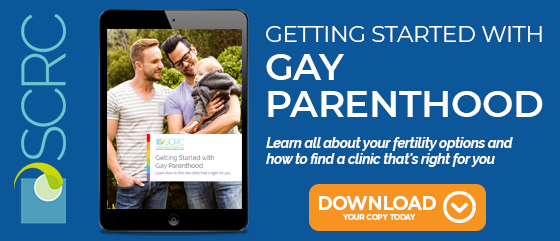
For the first time in history, gay men are able to have biological children and be listed exclusively on the birth certificate as the fathers. It’s not the only way to do it, but it reflects the time we’re in. If you are a gay couple looking to become parents, you can.
Numerous options exist for gay fathers. They vary by state and affordability, among other factors, and it’s good to know what they are and what option will be best for your family.
Read more about the best states for LGBTQ+ family building ►
Where do we begin?
Before we talk about options, let’s get some of the really important stuff out of the way first.
- Get a sperm analysis done. You need to know what options are on the table for you. Low sperm count or motility in one or both of you may alter your plans, especially if you want biological children.
- On that note, how would you feel about not being genetically related to your child? That can be really hard for some people. Is that important to you? Is it more important to one of you? How will you handle it both individually and as a couple? Be honest because you answers may determine how you proceed. Whatever happens, you’ll both be parents. You get to decide what that looks like.
- Are you open to being foster parents? If so, what will that look like for you? Will you strictly foster or might you be open to adoption?
- How many kids will you have? Some options are pricier than others. Setting expectations, talking with insurance and surrogacy/adoption/egg donor agencies, setting a budget can all help in preparing for kids and determining your family size.
Exploring your options.
Once you’ve got a clear idea of the kind of family you want to build, let’s talk options.
Fostering and Adoption.
The US is home to approximately 16,000 adoptive gay parents. Where about 3% of hetero couples are raising adopted kids, more than 20% of gay couples are. It’s a similar story with foster parents. 0.4% of hetero couples are foster parents while 3% of gay parents are. There’s a shortage of good parents willing to foster and/or adopt children, especially teenagers. It may be a great choice for your family.
Adoption by same-sex couples is legal in the US, though the laws vary by state. Get a good lawyer on your side and start exploring gay-friendly adoption agencies.
Sperm freezing.
Going the IVF route? It can take a while to find a donor and/or surrogate, so bank your sperm now to use down the road. (Or, optimize your sperm health for a few months and then bank it at your prime.) It will also be subject to FDA-mandated screening for infectious diseases. When your doctor is ready for the procedure, you’ll be ready, too.
Sperm donation.
Men are just as likely as women to have fertility problems. It’s estimated that about 1/3 of all infertility cases can be attributed to male factor infertility. If it affects you, that’s okay. Or maybe you’ve decided to not be biological parent/s. Work with your fertility clinic to arrange for a sperm donor.
Egg donation.
You can choose an egg donor from a bank, or someone you know personally (if you go that route, definitely have a talk with your lawyer). Together, you and your partner can search the database for a donor that can best contribute to the family you’re creating.
Surrogacy.
Once you’ve got your egg and sperm, you can proceed with making embryos. They can remain frozen while you work with your agency or fertility clinic to choose a surrogate to work with. As always, you’ll want to be clear on laws and relevant policies with regard to surrogacy, parenthood and legal rights. Talk it over with your partner, your lawyer and your surrogate before proceeding.
Learn more about surrogacy laws by state in this post ►
Embryo donation.
For couples who can’t or decide not to pursue biological fatherhood, embryo donation is an option. Often couples who undergo IVF treatment are left with viable embryos. Rather than have more kids or destroy the embryos, they donate them. It’s often a more affordable route to parenthood than starting IVF with egg/sperm donations. Ask your fertility specialist about options for your family.
The Process to Parenthood
If your sperm analysis results were less than ideal, now’s the time to start optimizing sperm health. A few ways include cutting alcohol and smoking; boosting exercise, vitamins and foods high in healthy fats. Talk to your doctor about what you can do, too. Give yourself 3-4 months of lead time, as that how long it will take for your new health regimen to impact your sperm.As you’re boosting your health and waiting for sperm 2.0 to generate, you’ve got plenty to keep you busy.
- Set up a consult. If you’re going down the path of assisted reproduction, choosing a good clinic will be your starting point. You want a doctor up on the latest advances in the field and a supportive staff. Ideally they’ll be able to help you at every point in the process, including donors and/or surrogates as necessary.
- If you’re going to foster or adopt, you’ll want to go with an agency you feel good about and work well with.
- Find yourself a good lawyer. Ask around for recommendations, do web searches, go around to offices and set up meetings. This is a months-long, highly involved process. There are often legal implications to deal with, no matter what path you go down.
- You’re about to start down an emotionally-intense journey (not to mention the emotional journey once you become a parent). Get a good team on your side. Be sure your team includes a supportive group of friends and family.
- Select your donor/s. We know now that it’s not nature vs. nurture but nature and nurture. You’re in charge of the nurture part. What will you choose for nature? Come up with an essential list of characteristics you’re looking for (including health and family traits, interests, physical traits and features).
- Start the process. If you’re going to move forward with IVF, it takes at least a few weeks before you can even try for successful pregnancy. Then, it typically takes some more weeks or months for that to be successful. Your doctor will help you through.
- If you’re with an adoption agency, there will be plenty to keep you busy for the first few months after you’ve signed on with them. There are inspections and paperwork galore.
It will all be exciting and draining. Remember your team.
Finally, work closely with your agency/clinic. The process in every state, agency and clinic will generally follow this outline, but staying in close communication with them and being up front with your questions will ensure you don’t miss anything important.
Share this on social media:





